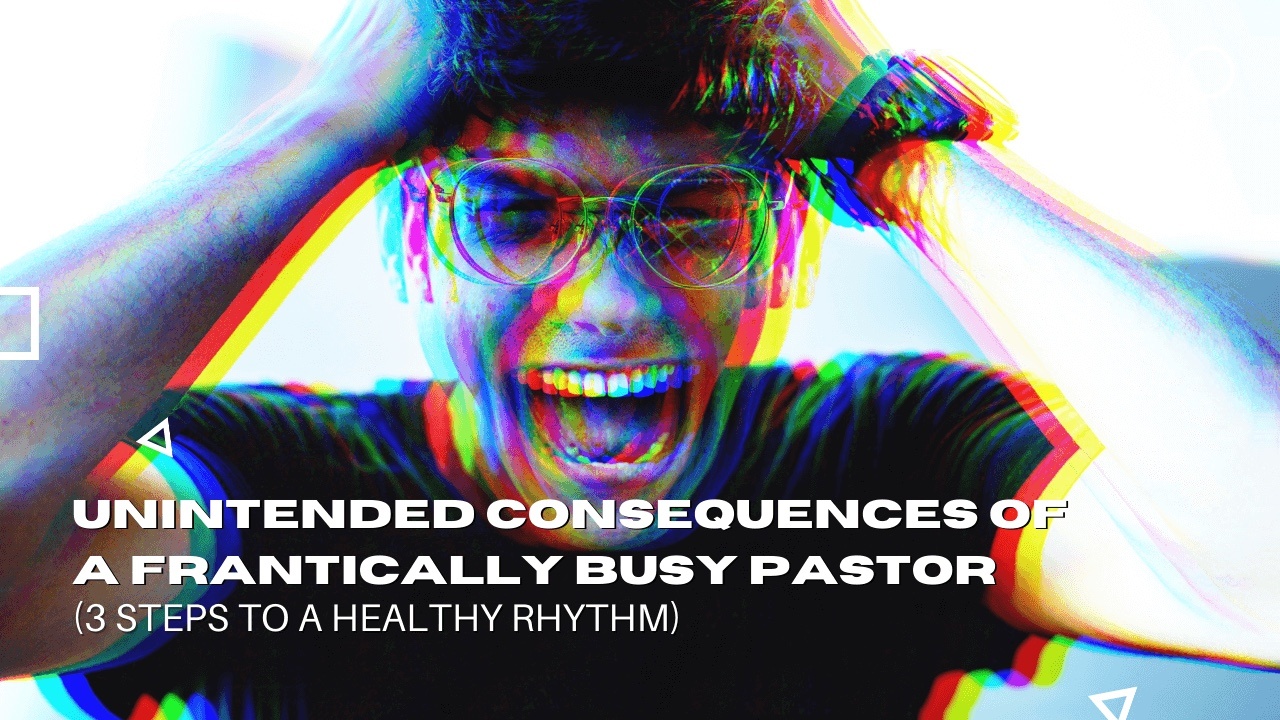The Unintended Consequences of a Frantically Busy Pastor (3 Steps to a Healthy Rhythm)
Dec 01, 2021
Pastor, you're too busy and that busyness is resulting in several unintended consequences for you and the church you lead.
You've likely preached on the topic and you've pleaded with your people to make necessary changes to their schedule. But I'm here to plead, not with your people, but to plead with you.
When Covid began, you likely saw your regular rhythms be completely obliterated. It's now time for a reset if you haven't already done one. Your health depends on it. Your church's health depends on it.
This is part 1 of the Leading the Post-Covid Church series.
The Unintended Consequences of a Frantically Busy Pastor
When you're frantically busy, you inch closer and closer to exhaustion. And when you're exhausted...
You make bad decisions. Your desire to merely want to please people and take the easy route increases because you just don't have the energy to deal with the repercussions of making the right decision.
You're less able to guard your heart. All of a sudden, you're trying to distract yourself or numb yourself or both. With every increased level of exhaustion you reach, the need for the distraction or the numbing agent to be stronger increases. And before too long, you're doing something that isn't good for you.
Your capacity to love others is greatly diminished. You don't feel loved, you don't feel cared for, and that hardens your heart. Look at all I'm doing and, of course, no one takes any notice. It must be nice to have someone you can call on to help you when you need it. Those thoughts start to invade your mind in more moments of ministry than you'd like to admit.
You lack margin to prioritize what's most important. You want to host people in your home. You want to make disciples in intentional and consistent ways. You want to invest in your spouse and your kids more. You want to have some times of getting together with friends and having fun. In an ideal world, you would prioritize these things. But instead, you keep going with none of those things being the priority they need to be because you have no margin to fit them in.
When you think about the future, it's hard to see anything clearly. The big picture seems blurry. You want to be able to plan in such a way that what you do today is connected to a bigger vision for the future, but you're struggling to see the forest from the trees.
[Insert TV Infomercial voice] But wait, there's more!
Don't miss this: the rhythm of the leader paces the rhythm of the church.
This has always been true but today, in this post-Covid world, it's no longer ignorable.
That's right, a pastor's busyness doesn't only affect themselves, it affects the church they lead.
Your leaders feel what you feel (and in this case, that's not good). You're not doing as great of a job hiding it as you think you are. They pick up on your anxiety because in your frantic busyness, you're passing on your anxieties to them. The last-minute urgent projects, the short temper, the waffling back and forth with decisions, the lack of direction, they're seeing it all.
Your church lacks margin. Because you're allowing yourself to indulge in your anxieties through constant activity, the church calendar is getting filled to the brim. And because you're not taking a step back and considering what all these things are doing to the people you're expecting to be at all these events, you're building busyness into your church culture. All because you're grasping for control without any perspective for the bigger picture.
The rhythm of the leader paces the rhythm of the church.
Why are you so busy?
Eugene Peterson, in an article he wrote for the Leadership Journal (now CT Pastors), said that pastors become busy for two reasons:
- A desire to appear important
- Laziness
But in this moment in history, I believe that there's something different at work. Something deeper.
I believe that the reason you may be frantically busying yourself is because you're trying to cope.
Ministry feels different now. It feels the same, but it feels different.
Not only that, but the world feels different now. It feels the same, but it feels different.
But coping with all these changes with busyness isn't the answer.
3 Steps to a Healthy Rhythm

1. Get honest with yourself.
Am I living a well-ordered life or am I living a frantically busy life?
Coming to terms with this is the first step because we can't change what we're not willing to admit exists.
But remember, the issue isn't merely that you're busy, it's why you're busy. So dig deeper and prayerfully investigate what is under the surface.
What toxic soil is that busyness growing out of?
Once you identify it, confess it to the Lord.
2. Do an audit.
You may want someone to come alongside you in this to help you answer these questions.
- What are you doing that needs to stop?
- What needs to stay but change?
- What do you need to start?
Here you're simply aligning your priorities with your schedule. You want to make sure you're setting aside time for the people and the things that need to be at the top of your priority list.
What you're looking for, in the end, is a list of your most important time priorities that you'll take and begin plugging into your days, weeks, and months. It could look something like this:
- Sabbath
- Time with the Lord
- Time with your spouse
- Time with your kids
- Exercise
- Sermon work
- Disciple-making work
- Time with leaders
- Time for hospitality
3. Re-build your rhythms.
No one is going to add structure to your days, weeks, and months if you don't do so yourself.
Ministry, from a work-schedule standpoint is a blessing and a curse. Why?
Because ministry is flexible.
Flexibility is why you can make it to your kid's game.
Flexibility is also why you work on Saturday, cramming for your message.
Flexibility is why you're working at 5am and still going at 9pm.
And, yes, there are some days that you can't control your schedule. Emergencies happen and you're on call. But that's not every day.
So, what should you do?
Give yourself structure around your most important priorities.
The Impact of a Pastor With a Healthy Rhythm
When you begin to rebuild healthy rhythms into your life and work, you'll start to see those unintended consequences listed above dissipate and make way for completely different results.
Over time, you'll begin leading as your best self. You'll be able to see things more clearly, you'll be able to make better decisions, and you'll have a fuller cup to pour into others from.
And your team and the church you lead will begin to make shifts as well.
Your new-found love for healthy rhythms will seep into the church calendar and you'll make sure that church members aren't becoming frantically busy trying to keep up with church programming.
Your team will likely begin following you into healthier rhythms but regardless if they do, they will be more at ease because you'll be more at ease.
The rhythm of the leader paces the rhythm of the church.
Don't forget that.
Get Practical Pastoral Training
This article is part 1 of the Leading the Post-Covid Church series. Be sure to not miss an article in this series or any other new piece of practical pastoral training content we create by subscribing. It's free and in exchange for you joining the community here, I'll send you my 10-Step Guide to Writing a Sticky Sermon PDF.
Write sermons that stick!
Learn the 10-step process to crafting and writing a memorable, transformational sermon. Download this free guide today.
We hate SPAM. We will never sell your information, for any reason.



